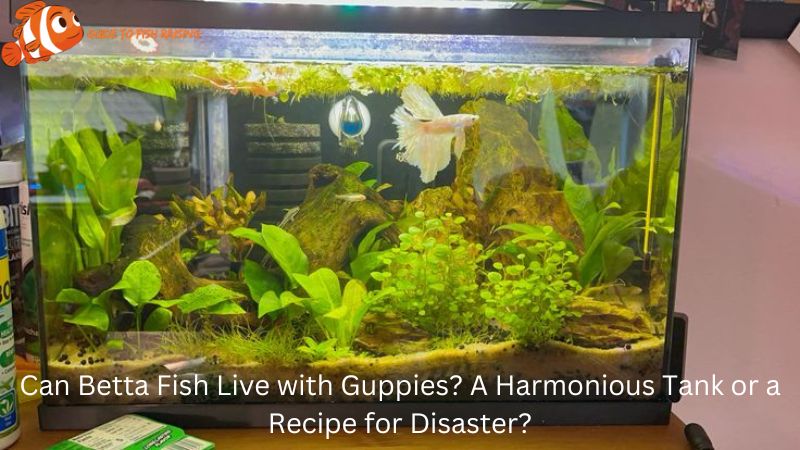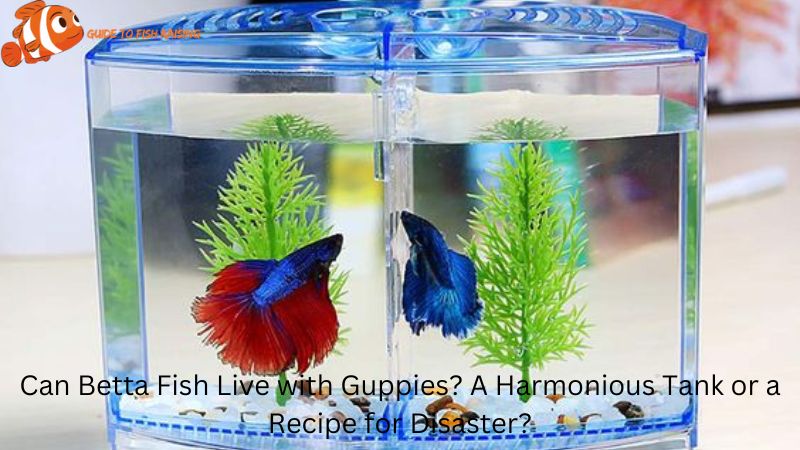Betta Fish
Can Betta Fish Live with Guppies? A Harmonious Tank or a Recipe for Disaster?
Can Betta Fish Live with Guppies – The question of whether betta fish can live with guppies is a common one among aquarium enthusiasts. Both bettas and guppies are popular choices for home aquariums due to their vibrant colors and engaging behaviors. However, their compatibility in a shared tank can be a topic of debate. This article Guide to Fish Raising delves into the nature of both species, their habitat requirements, and the considerations necessary to determine if they can coexist peacefully.
Table of contents
ToggleUnderstanding Betta Fish
Nature and Behavior
Betta fish, also known as Siamese fighting fish, are renowned for their vivid colors and striking fin displays. They are also infamous for their aggressive behavior, especially among males. This aggression stems from their territorial nature. In the wild, bettas are solitary creatures and often engage in fights with other males to establish dominance and territory. This inherent aggression can make them challenging to house with other fish.
Key Behavioral Traits:
- Territoriality: Bettas fiercely defend their territory, especially against other bettas.
- Bubble Nests: Male bettas build bubble nests as part of their breeding behavior. This is a sign of a healthy and content betta.
- Curiosity: Bettas are curious fish and enjoy exploring their environment.
- Surface Breathers: Bettas have a labyrinth organ that allows them to breathe air from the surface, so they frequently swim to the top of the tank.
Habitat Requirements
Temperature:
- Betta fish thrive in warm water, with an ideal temperature range of 76°F to 82°F (24°C to 28°C). Consistent water temperature is crucial for their health, as fluctuations can cause stress and illness.
Water Quality:
- pH Levels: Bettas prefer slightly acidic to neutral water, with a pH range of 6.5 to 7.5. Regular water changes and monitoring are necessary to maintain this balance.
- Water Hardness: Bettas do well in water with a hardness of 3-5 dGH (degrees of general hardness).
Tank Size:
- A minimum tank size of 5 gallons is recommended for a single betta. Larger tanks provide more swimming space and help maintain water quality stability. Smaller tanks can lead to poor water conditions and stress for the betta.
Tank Setup:
- Decorations and Hiding Spots: Bettas enjoy a well-decorated tank with hiding spots. Items like caves, rocks, and plants provide shelter and reduce stress.
- Plants: Live or silk plants create a natural environment. Floating plants can provide cover and reduce light, mimicking the betta’s natural habitat.
- Water Flow: Bettas prefer gentle water flow. Strong currents can stress them and hinder their ability to swim comfortably.
- Lighting: Bettas do not require intense lighting. Moderate lighting that mimics their natural habitat is ideal. Too much light can stress them, while too little can affect plant growth if you have live plants.
Understanding Guppies
Nature and Behavior
Guppies are popular freshwater fish known for their vibrant colors and peaceful disposition. They are social and thrive in groups, making them ideal for community tanks. Guppies are active swimmers and enjoy exploring their environment. However, they are also prolific breeders, and an aquarium can quickly become overpopulated if males and females are housed together without population control measures.
Key Behavioral Traits:
- Social Nature: Guppies are social and do best in groups. A group of at least six guppies is recommended to ensure they feel secure and exhibit natural behaviors.
- Active Swimmers: Guppies are energetic and constantly on the move, often swimming throughout all levels of the tank.
- Breeding: Guppies are livebearers, meaning they give birth to free-swimming fry. They can reproduce rapidly, leading to overpopulation if not managed properly.
- Community-Friendly: Guppies generally get along well with other peaceful fish, making them suitable for community tanks.
Habitat Requirements
Temperature:
- Guppies prefer warm water with an optimal range of 72°F to 82°F (22°C to 28°C). Maintaining a stable temperature within this range is crucial for their health and activity levels.
Water Quality:
- pH Levels: Guppies thrive in slightly alkaline water, with a pH range of 7.0 to 8.0. Regular monitoring and maintenance are necessary to keep the water within this range.
- Water Hardness: Guppies prefer moderately hard to hard water with a hardness level of 8-12 dGH (degrees of general hardness).
Tank Size:
- A minimum tank size of 10 gallons is recommended for a small group of guppies. This provides enough space for their active swimming and helps maintain water quality. Larger tanks are better for accommodating more fish and reducing stress.
Tank Setup:
- Plants and Decorations: Guppies benefit from a well-planted tank with open swimming areas. Live or artificial plants provide shelter and mimic their natural habitat.
- Open Swimming Areas: Guppies need open areas to swim freely. Avoid overcrowding the tank with decorations.
- Water Flow: Moderate water flow is ideal for guppies. Strong currents can exhaust them, while stagnant water can lead to poor water quality.
- Lighting: Guppies do well with standard aquarium lighting. Ensure a regular light-dark cycle to mimic natural conditions and promote healthy behavior.
Compatibility Considerations

When considering whether bettas and guppies can live together, several factors need to be addressed:
Aggression
The primary concern when housing bettas with guppies is the betta’s aggressive nature. Male bettas, in particular, may see the colorful, flowing fins of guppies as a threat or a trigger for aggression. This can lead to chasing, fin nipping, and potentially fatal injuries for the guppies.
Gender of the Betta
The gender of the betta can influence compatibility:
- Male Betta: Male bettas are more territorial and aggressive, making them less suitable for cohabitation with guppies.
- Female Betta: Female bettas are generally less aggressive than males and may coexist more peacefully with guppies, though caution is still necessary.
Tank Size and Environment
A larger tank with ample hiding spots and plants can help mitigate aggression by providing guppies with places to retreat. A densely planted tank can create natural barriers and reduce direct confrontations between bettas and guppies.
Monitoring and Adjustment
If you choose to house bettas and guppies together, it’s crucial to monitor their interactions closely. Be prepared to separate them if any signs of aggression or stress become apparent. A separate tank or divider may be necessary to ensure the safety of all fish involved.
Strategies for Success
Introduce Fish Gradually
When introducing bettas and guppies to the same tank, it’s essential to do so gradually. Start by acclimating the fish to the tank conditions separately, then use a divider or breeding box to allow them to see and get used to each other without direct contact. This can help reduce initial aggression.
Provide Adequate Space
A larger tank with a minimum of 20 gallons is recommended if you plan to keep bettas and guppies together. More space reduces territorial disputes and gives each fish enough room to establish their territory.
Create Hiding Spots
Decorate the tank with plenty of plants, caves, and decorations to provide hiding spots and break up the line of sight. This can help reduce stress and aggression by offering refuge for guppies if the betta becomes aggressive.
Choose Tank Mates Wisely
If you are determined to keep bettas with other fish, consider tank mates with similar temperaments and environmental needs. Peaceful, fast-swimming fish that can evade potential aggression, such as certain types of tetras or bottom-dwelling fish, may be better suited than guppies.
Can Betta Fish Live with Guppies
When choosing tank mates for bettas, it’s essential to consider their temperament and habitat requirements. Here are some detailed suggestions for compatible tank mates:
Corydoras Catfish
Characteristics:
- Peaceful and social bottom-dwellers.
- Typically grow to about 2-3 inches.
- Prefer to be in groups of 4 or more.
Tank Requirements:
- Need a soft substrate like sand to prevent injury to their delicate barbels.
- Enjoy well-planted tanks with plenty of hiding spots.
- Thrive in water temperatures of 72-78°F (22-26°C).
Compatibility with Bettas:
- Since they occupy the bottom of the tank, they rarely interact with bettas, reducing the risk of conflict.
- Their peaceful nature means they won’t provoke the betta.
Neon Tetras
Characteristics:
- Small, colorful, and active schooling fish.
- Grow up to 1.5 inches in length.
- Prefer to be in groups of at least 6 to feel secure.
Tank Requirements:
- A well-planted tank with open swimming areas is ideal.
- Require water temperatures between 70-81°F (21-27°C).
- Prefer slightly acidic to neutral pH (6.0-7.0).
Compatibility with Bettas:
- Their small size and fast swimming ability help them avoid betta aggression.
- Neon tetras can add a vibrant splash of color without causing stress to the betta.
Ghost Shrimp
Characteristics:
- Transparent, small shrimp that grow up to 1.5 inches.
- Low-maintenance and contribute to tank cleanliness by scavenging.
Tank Requirements:
- Need a tank with hiding spots like plants, rocks, or shrimp tubes.
- Prefer water temperatures of 65-82°F (18-28°C).
- Thrive in neutral pH water (6.5-7.5).
Compatibility with Bettas:
- Ghost shrimp are unlikely to provoke bettas since they don’t compete for the same space.
- They help maintain the tank by eating leftover food and algae.
Harlequin Rasboras
Characteristics:
- Peaceful, schooling fish that grow up to 2 inches.
- Have a distinctive black triangular patch on their body.
Tank Requirements:
- Prefer well-planted tanks with swimming space.
- Thrive in water temperatures of 72-80°F (22-27°C).
- Require slightly acidic to neutral pH (6.0-7.5).
Compatibility with Bettas:
- Their peaceful nature and tendency to swim in the middle and upper levels of the tank make them suitable companions.
- Harlequin rasboras can avoid betta aggression due to their fast swimming and schooling behavior.
Conclusion
While it is possible for bettas and guppies to live together under certain conditions, it requires careful planning, monitoring, and willingness to make adjustments. The key factors to consider are the temperament of the betta, the tank environment, and the ability to provide adequate space and hiding spots. By understanding the needs and behaviors of both species, aquarists can make informed decisions to create a harmonious and healthy aquarium environment. If in doubt, consider alternative tank mates that are more compatible with bettas to ensure the well-being of all inhabitants.





